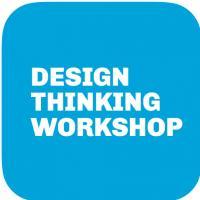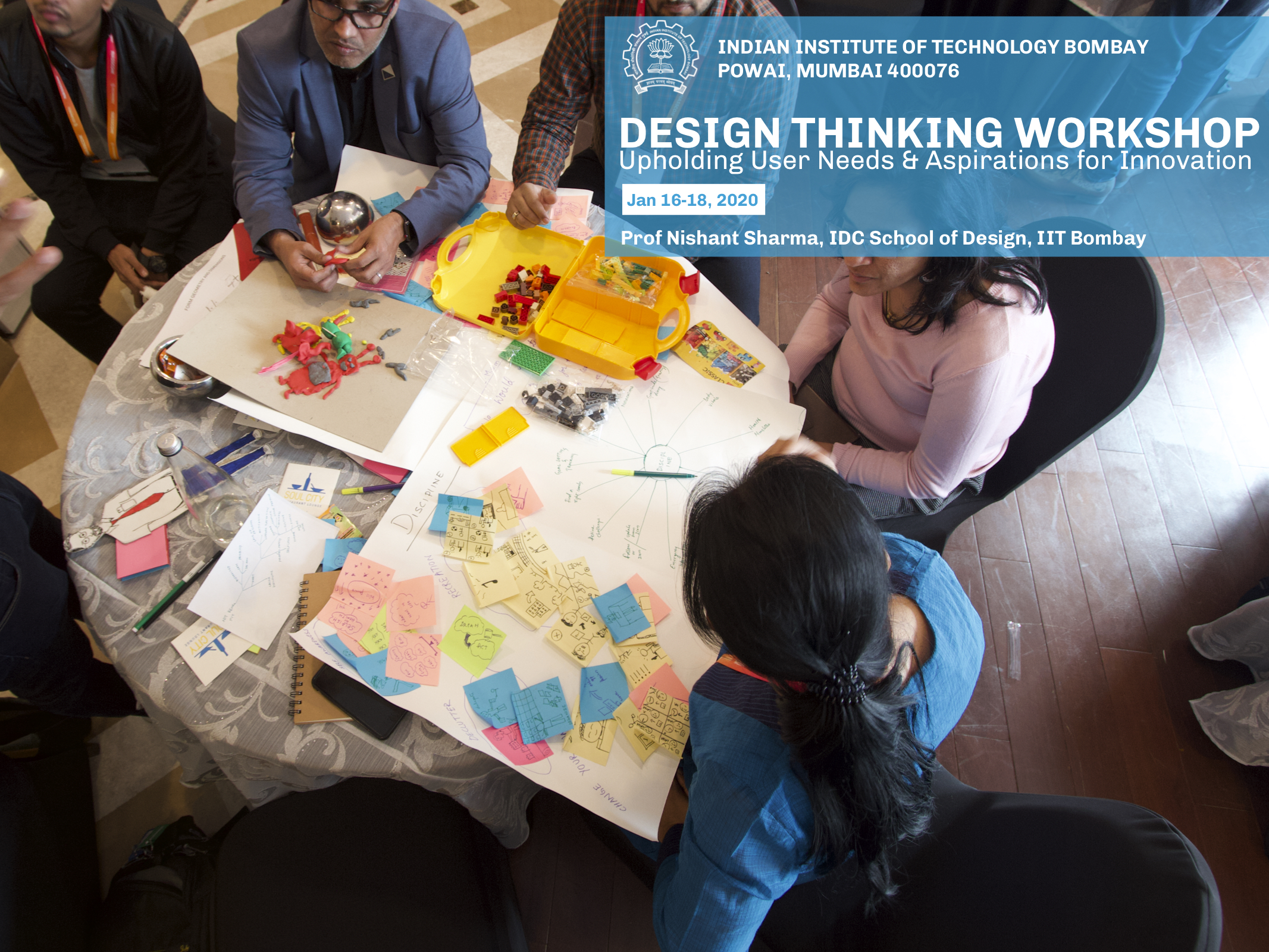
Design Thinking: Upholding User Needs & Aspirations for Innovation

Introduction
Design Thinking is a human-centred design process, undertaken by designers to solve complex (wicked) design problems when they design & develop new products/services.The uniqueness of Design Thinking is in 'upholding user needs and aspirations for innovation’. It begins by gaining in-depth user-insights through empathy, followed by creative ideation to innovate new concepts, prototype them and finally test with users to check the usability, viability and feasibility. Businesses today, have enormously benefitted from Design Thinking to solve increasingly complex and difficult problems across different sectors. Furthermore, many businesses and organisations have achieved higher business success rate by boosting Design Thinking culture to drive innovation.
This short term certificate program ‘Design Thinking: Upholding User Needs & Aspirations for Innovation’ will help participants experience the power of this innovative problem solving approach through lectures, case studies and hands-on workshop. Participants will learn various techniques employed in different stages of Design Thinking in the workshop.
Key Objectives/learning Outcomes
• Cultivate Design Thinking ability as culture to drive innovation in your organisation.
• Develop mindset to work closely with (for) users while designing, innovating, developing and testing solutions for new products, services and systems.
• Develop capability to arrive at deeper user insights by empathising with potential users through observational research and in-depth interviewing.
• Ability to participate and conduct constructive brainstorming sessions, ideation sessions in interdisciplinary team in search of new ideas and solutions.
• Developing skills for making and presenting prototypes of the envisaged solutions individually and in team.
• Develop ability to test solution and work on feedback loops.
Program Highlights
This unique three-day workshop conducted by eminent professors of IDC School of Design IIT Bombay would: - Familiarise participants with Design Thinking methodology and its components through lectures & case studies
- Expose them to effectively practice Design Thinking stages through case examples, from need analysis to interdisciplinary collaborations, visualisation and story telling through a hands-on design workshop
- Sensitise participants towards sketching, modelling, visualisation, storytelling, communication and presentation through design assignments, creativity and warm-up exercises
- Help participants make a roadmap for deployment of Design Thinking in the organisation, to design and develop new products and services.
Upon successful completion of course certificate of completion from Continuing Education Program, IIT Bombay will be given.
Curriculum
A) Through Lectures and Case Studies
Overview of Design Thinking Why everyone talks about it now for solving complex and difficult products/services or business problems across different sectors?
Roots of Design Thinking in Human Centric Design Process. Why is it important to learn Design Thinking from Design Schools?
Design Thinking Process. Five stages in Design thinking process: Empathise, Define & Interpret the problem, Creative Ideation, Prototyping, Testing.
Landscape of user-centric innovation, lead user innovation and user-led innovation?
Tools and Techniques for Empathy, Requirement Capture, Understanding unmet and unarticulated needs and aspirations. Analysis of user data to insights and insights to actionable design directions.
How interdisciplinary teams working together can bring about new designs and innovations through creative ideation, making and testing. Tools and techniques for creative ideation. Role of creative approaches like visualisation, modelling & prototyping, story telling etc.
B) Through Hands-on Workshop
i) ‘Empathise with people who we design for’ to access unmet and unarticulated user needs.
Empathise
User research: Interviewing (Stories, anecdotes)
Observational Research
Ergonomics and Human Factors
Hands-on: Conducting User Research (Empathise)
ii) Define and interpret the problem as a design problem
Arriving at deeper insights and design ideas
Affinity diagrams
Empathy map
Hands-on: Define and Interpret problem
iii) Ideate: Divergence and Convergence
Creative Ideation techniques
Sketching, 3D sketching
Visualisation, Story Telling
Hands-on: Ideation sessions
iv) Prototyping: Ideas to presentable concepts
Developing mock ups, models, and prototypes
Quick and Dirty Prototyping
Role of soft, hard materials
Hans-on: Build, model, Prototype
v) Testing: Checking back with users’ needs and aspirations
Presenting and communicating Design
Testing prototypes, obtaining feedback to refine product
Usability and ergonomic testing
Hands-on: Testing/Evaluation with users
Who May Benefit
• Senior and Middle Management from different domains & sectors
• Design Team
• Research and Development team
• Project Leads
• Product Managers
• Marketing and Sales team
• Business Analysts
• Faculty members of Design and Engineering Institutes
• Government Employees in Design Departments
• Design Enthusiasts
Pedagogy
Lectures
Case studies
Guided hands-on design workshop sessions through case examples: From In-depth user research to creative ideation to final evaluation of evolved concept.
Design & Creativity exercises, Icebreaking & fun exercises.
Sketching and modelling sessions
Storytelling
Videos
One to one discussions
Faculty: Prof Nishant Sharma
Dr. Nishant Sharma is currently a Professor of Mobility & Vehicle Design (MVD) in IDC School of Design, IIT Bombay. As a professor, he teaches postgraduate level courses, supervises Master of Design & PhD students, lead funded research/consultancy projects from government, private companies & non-government organisations and perform various institute level & department level administrative roles. He finished his BE (Production Engg. in 1998) from NIT Surat, MDes (Industrial Design in 2001) from IIT Delhi and PhD from IIT Guwahati. Title of his PhD is 'Evolving a Context-Sensitive participatory method in Design of Personal Transport’. Before joining academics, he had a successful career as a vehicle designer in automobile OEMs (Indian and MNCs); General Motors India, Aprilia Motors (Hero Global Design), Bajaj Auto Ltd etc. He was responsible for creative design and CAS for two wheelers, cars, vehicle accessories and components. In industry, he had a rare opportunity to lead the cross cultural and cross border design team at early stage of his career. With intellectual rigour, vision, knowledge and ability to mentor teams rooted in his professional experience, he moved to academics. He had the privilege of pioneering vehicle design education in India by developing philosophy and writing complete curriculum of India’s first specialised Transportation & Automobile Design program at reputed National Institute of Design, Ahmedabad. He was then instrumental in setting up Mobility and Vehicle Design program at India’s best technology institute- IIT Bombay. This post graduate program in its tenth year upholds some unique values viz. designing mobility devices for social context, designing for disability, automobile styling, innovations, technology & mobility, future of mobility etc. Outcomes of students and faculty members depict a broad range of products, from wheelchairs to cars to boats. The program comprehensibly looks at all kinds of mobility needs. He carved out all the details of the program like labs/studios, student selection, course/project evaluation and collaborations with industry and academic partnership. As Principal Investigator Prof Nishant Sharma received funding from various ministries of Government of India (Human Resources, Ministry of Railways, Ministry of Science and Technology) and big corporates like Volvo Sweden, Samsung Korea, Thermolab Lab India, CEAT Tyres India etc. for broad range of mobility and industrial design related researches/projects. Some of these projects are; Tricycle for Paraplegics (Ministry of Human Resources), Interior Design of Drivers Cab for New EMU Rakes (Ministry of Railways), Storage Possibilities and Walk through clearance in Indian Trucks (Volvo), Concept Design of One-Ton Goods Carrier for Indian City Conditions (Volvo).
As an academic expert from India, he has been on the panel of experts for Hyundai headquarters in Korea for four years to review their future vehicle launches. He advises and mentors new start-ups to promote entrepreneurial spirit especially in the domain of design for special needs.
IDC School Of Design, IIT Bombay
IDC School of Design at the Indian Institute of Technology (IIT Bombay) in its 50th year, offers an excellent environment for academics, research and applications in the field of design.
IDC has academic programs in the areas of Industrial Design, Communication Design, Interaction Design, Animation and Mobility & Vehicle Design. The education Programme at IDC is a unique mix of pedagogic experimentation with pragmatic design approach and blends hard-core problem solving with design research. New thoughts, philosophies and research into several aspects of design are experimented and integrated to have continuous revitalisation of the academic programmes at IDC
Several areas have been identified for research. Faculty members along with students and other research and design staff work together on these issues. The centre interacts with industries and institutions for promotion and awareness of design. These are in the form of organising seminars, conducting short term courses and workshops. In the area of design practice, IDC offers professional design consultancy and advisory services to industries and other organisations.
Venue For Classes
Seminar Room (II Floor), Jalvihar Guest House
IIT Bombay, Powai, Mumbai 400076
Course Fees
Fees for professionals: Rs. 32450 (Including GST)
Fees for Govt Emp/College Teachers: Rs. 27335 (Including GST)
Fees for Students (Limited Seats): Rs. 16750 (Including GST)
Fees includes Tea/coffee and Lunch
Registration
For registration, please click: https://portal.iitb.ac.in/ceqipapp/courseDetails.jsp?c_id=3083
Important Dates
Last date for registration: 11 Jan, 2020
Start Date: 16 Jan, 2020
End Date : 18 Jan, 2020
Address For Correspondence
Nishant Sharma, PhD
Professor
Industrial Design Centre (IDC)
IIT Bombay, Powai
Mumbai- 400076, India
Ph: +91 22 25767815
Mo: +91 9769937815
Email: nishantsharma@iitb.ac.in